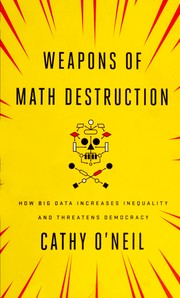Check nearby libraries
Buy this book

A former Wall Street quant sounds an alarm on the mathematical models that pervade modern life and threaten to rip apart our social fabric We live in the age of the algorithm. Increasingly, the decisions that affect our lives where we go to school, whether we get a loan, how much we pay for insurance are being made not by humans, but by mathematical models. In theory, this should lead to greater fairness: everyone is judged according to the same rules, and bias is eliminated. And yet, as Cathy O'Neil reveals in this urgent and necessary book, the opposite is true. The models being used today are opaque, unregulated, and incontestable, even when they're wrong. Most troubling, they reinforce discrimination. Tracing the arc of a person's life, O'Neil exposes the black box models that shape our future, both as individuals and as a society. These "weapons of math destruction" score teachers and students, sort CVs, grant or deny loans, evaluate workers, target voters, and monitor our health. O'Neil calls on modellers to take more responsibility for their algorithms and on policy makers to regulate their use. But in the end, it's up to us to become more savvy about the models that govern our lives. This important book empowers us to ask the tough questions, uncover the truth, and demand change.
Check nearby libraries
Buy this book

Previews available in: English
Subjects
math, big data, inequality, democracy, Social indicators, Moral and ethical aspects, Social conditions, Mathematical models, Data mining, Algorithms, Mathematics, award:euler_book_prize, nyt:education=2016-10-09, New York Times bestseller, Human behavior, mathematical models, Computer algorithms, Computers, social aspects, Données volumineuses, Aspect social, Aspect politique, Indicateurs sociaux, Modèles mathématiques, Aspect moral, Conditions sociales, COMPUTERS, Data Modeling & Design, Political aspects, Social aspects, Human behaviorTimes
2017Showing 2 featured editions. View all 15 editions?
| Edition | Availability |
|---|---|
|
1
Weapons of Math Destruction: How Big Data Increases Inequality and Threatens Democracy
Sep 05, 2017, Broadway Books, Crown
Paperback
in English
0553418831 9780553418835
|
eeee
|
|
2
Weapons of Math Destruction: how big data increases inequality and threatens democracy
2016, Allen Lane
Paperback
in English
0241296811 9780241296813
|
aaaa
|
Book Details
Table of Contents
Edition Notes
Includes bibliographical references and index.
Classifications
Contributors
The Physical Object
ID Numbers
Work Description
A former Wall Street quant sounds an alarm on the mathematical models that pervade modern life — and threaten to rip apart our social fabric
We live in the age of the algorithm. Increasingly, the decisions that affect our lives—where we go to school, whether we get a car loan, how much we pay for health insurance—are being made not by humans, but by mathematical models. In theory, this should lead to greater fairness: Everyone is judged according to the same rules, and bias is eliminated.
But as Cathy O’Neil reveals in this urgent and necessary book, the opposite is true. The models being used today are opaque, unregulated, and uncontestable, even when they’re wrong. Most troubling, they reinforce discrimination: If a poor student can’t get a loan because a lending model deems him too risky (by virtue of his zip code), he’s then cut off from the kind of education that could pull him out of poverty, and a vicious spiral ensues. Models are propping up the lucky and punishing the downtrodden, creating a “toxic cocktail for democracy.” Welcome to the dark side of Big Data.
Tracing the arc of a person’s life, O’Neil exposes the black box models that shape our future, both as individuals and as a society. These “weapons of math destruction” score teachers and students, sort résumés, grant (or deny) loans, evaluate workers, target voters, set parole, and monitor our health.
O’Neil calls on modelers to take more responsibility for their algorithms and on policy makers to regulate their use. But in the end, it’s up to us to become more savvy about the models that govern our lives. This important book empowers us to ask the tough questions, uncover the truth, and demand change.
— Longlist for National Book Award (Non-Fiction)
— Goodreads, semi-finalist for the 2016 Goodreads Choice Awards (Science and Technology)
— Kirkus, Best Books of 2016
— New York Times, 100 Notable Books of 2016 (Non-Fiction)
— The Guardian, Best Books of 2016
— WBUR’s “On Point,” Best Books of 2016: Staff Picks
— Boston Globe, Best Books of 2016, Non-Fiction
Links outside Open Library
Community Reviews (0)
Feedback?| March 10, 2024 | Edited by bitnapper | Edited without comment. |
| March 10, 2024 | Edited by bitnapper | Edited without comment. |
| March 10, 2024 | Edited by bitnapper | Merge works |
| March 15, 2023 | Edited by ImportBot | import existing book |
| February 14, 2018 | Created by Consuelo Garcia Artazos | Added new book. |















